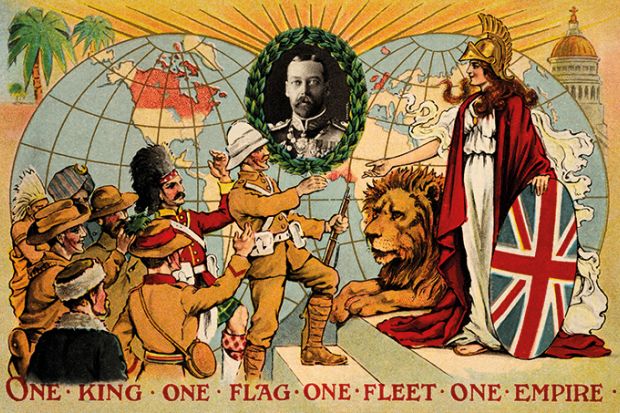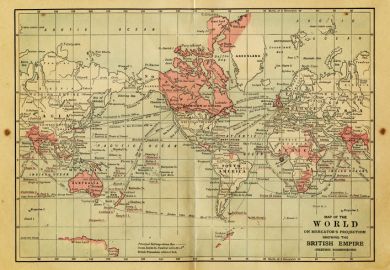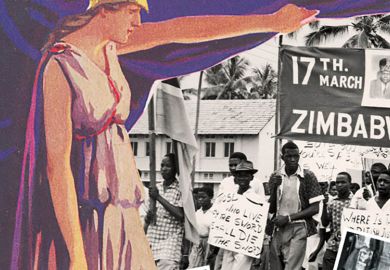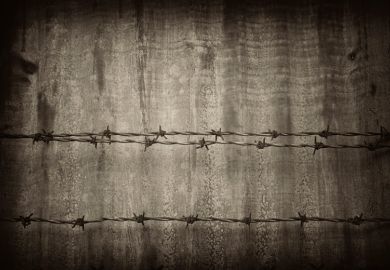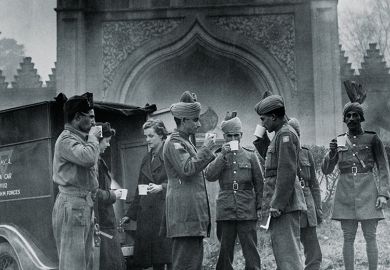Clusters of events, historians know, are sometimes coincidences.
But sometimes they indicate something more significant: an underlying dynamic, a process of which they are symptoms.
On 8 May, The Times will host an event on “the legacy of the British Empire”, at which participants will debate whether Britain’s empire was “a force for good or a force for evil”. Last weekend, on 14 April, Radio 4 aired a programme built around a dramatised reading of the notorious 1968 “Rivers of Blood” speech that made Enoch Powell, who once dreamed of becoming viceroy of India, famous. Earlier this month, The Times carried yet another column by Nigel Biggar, a theologian, ethicist of empire and defender of the "good" it did, decrying the “abuse” that he feels unsympathetic critics have directed at his work.
And in a rapid follow-up last week, the Daily Mail ran a two-page spread that denounced Biggar’s critics as a “Left-wing fifth column”, and singled out for assault Cambridge literary scholar Priyamvada Gopal. Gopal’s forthright Twitter posts served as the pretext for an extraordinarily abusive personal attack, effectively demanding that her university should silence the expression of her personal political views.
None of this is coincidence. There is a common thread running through the conservative media’s blustering about the British Empire. The Times’ event, hosted by the columnist and author of swashbuckling pop history Ben Macintyre, promises to “cut through the political correctness” to find “the real meaning” of imperial history. Biggar poses as the antagonist of a politically correct “orthodoxy”, which he has accused in his near-weekly newspaper columns of “stifling debate”.
The Daily Mail’s Stephen Glover claims that universities are sites of “cultural brainwashing” by “monochrome” leftists (who, to add to their disrepute, seem to buy their clothes from the “local charity shop”).
All claim that conservative opinions are no longer tolerated in universities and that the “real meaning” of the British Empire and its legacies, in particular, has been suppressed. None offers evidence to substantiate this claim, beyond vague references to lonely Tory dons or an alleged reticence to air unfashionable views among researchers.
None quotes from, or seems to have read, any of the scholarship they denounce, preferring to recycle a Boys’ Own ideology of empire that they mistake for historical insight. None takes the trouble to check whether the putative “orthodoxy”, in the literature or in the classroom, is in fact engaged in dialogue with other views. None seek any such dialogue: newspapers that publish Biggar and his supporters have repeatedly ignored requests for a right of reply from scholars of other persuasions.
As the finding of a recent parliamentary report, that allegations of a free speech crisis in universities are “exaggerated”, suggests, there is in fact no substance to their claims.
They are, rather, a pose, part of the wider appropriation and weaponising of “free speech advocacy” shared with other self-styled rightist provocateurs in the US and Europe.
Empire talk in Britain has become a privileged vehicle for the promotion of self-styled “provocative”, “unorthodox” opinion which in fact expresses views – about Britain, Britishness, and the place of both in the world – that were entirely orthodox, establishment and popular views 50 or more years ago.
They are provocative today only because they are offensive to contemporary sensibilities that have inherited half a century of struggles against white supremacy, racism, misogyny and imperialist jingoism.
They emanate, almost invariably, from privileged white men of a certain age and class, who see hierarchy as natural and violence as necessary for keeping order in “uncivilised” places. Their mantra of a “balanced” view of the British Empire comes down, in the Daily Mail’s phrase, to the assertion that it did a lot of good despite “the occasional massacre”.
Reappraising the British Empire in this vein has become a way in which race-thinking, if not outright racism and masculinism (The Times panel, we’re told, will examine the “men and motivations” of empire), if not misogyny, can be rehabilitated in a celebratory story that excuses occasional “excess” by evoking overall “benefit”.
The obvious historical facts that empire was a structural, not an occasional, violence – and that “our forefathers” did anything but “successfully” export democracy worldwide – are apparently just the inventions of badly dressed bolshies.
But then, none of this is really about the “real meaning” of the history of empire.
The empire-nostalgics reduce the complexity, dramatic scale and human tragedy of the past to an edifying morality tale of good intentions, a reckoning-up of Good and Bad Things. They seem to have forgotten that 1066 And All That was a satire.
Talking about the past has always been a way of expressing present anxieties. In Britain, talking about empire in this way today obviously has everything to do with right-wing visions of Brexit and Britishness and little or nothing to do with the realities of the Commonwealth as it is or the empire as it ever was.
But there is also something more significant at work, a continuity that ties Enoch Powell’s rhetoric, and the reasons Radio 4 producers recognised its importance for today to the logic of this rehabilitation of the imperial project, its idioms and attitudes, and the broader moment of which it is part.
Powell’s notorious line about the descendants of the enslaved and colonised gaining “the whip hand over the white man” was an early invocation of the fantasy of white victimhood that grips today’s alt-right and feeds hostility to migration and multiculturalism.
Empire makes good press for Establishment men offended by their loss of control over definitions of taste, decency and historical truth.
Trumpeting the virtues of colonialism while the Windrush generation faces the threat of deportation is cynical and disingenuous, as well as historically illiterate. It is a small, vicious, sign of our times.
Kim Wagner is a senior lecturer in British Imperial History at Queen Mary University of London. James McDougall is a fellow and tutor in modern history at Trinity College, Oxford.
Register to continue
Why register?
- Registration is free and only takes a moment
- Once registered, you can read 3 articles a month
- Sign up for our newsletter
Subscribe
Or subscribe for unlimited access to:
- Unlimited access to news, views, insights & reviews
- Digital editions
- Digital access to THE’s university and college rankings analysis
Already registered or a current subscriber?
